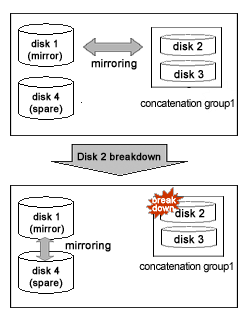

| PRIMECLUSTER Global Disk Services Configuration and Administration Guide 4.1 (Linux) |
Contents
 
|
| Appendix A General Notes | > A.2 Important Points |
If an I/O error occurs in a disk that is connected to a lower level group, a spare disk is automatically connected to the highest level mirror group, but not to the lower level group. For example, if a disk and a concatenation group are mirroring each other, and an I/O error occurs in one of the disks connected to the concatenation group, a spare disk is automatically connected in place of the concatenation group for mirroring.
A spare disk is selected independently of the disk case or controller number of a disk where an I/O error occurred.
In external hot spare mode (default), spare disks are selected randomly.
In internal hot spare mode, spare disks whose controller number is 0 and that do not belong to disk array units are selected.

There is no limit to the number of spare disks that can be registered with one class. Although there is no general rule in deciding the number of spare disks, it is recommended to assign 10% of disks and lower level groups for spare disks. In other words, one spare disk for every 10 disks or lower level groups combined is a good rule of thumb.
Spare disk automatic connection is restrained if there is not sufficient space on a spare disk to copy volumes in a mirror group. It is recommended to assign the largest size disk within the class for the spare disk.
Spare disks are not connected to groups that include proxy volumes. It is recommended to create proxy volumes in groups other than those that include volumes used by primary services, or on single disks.
Spare disks cannot be registered with shadow classes.
If disk array units with hot spare functions are mirrored, it is recommended to use their own hot spare functions.
If an I/O error occurs in a spare disk that was automatically connected to a mirror group, another spare disk will not automatically be connected in place of the failed spare disk.
The synchronization copying with hot spare is run at lower speed as compared to similar copying with other events (such as volume creation and disk creation) in order to suppress the load imposed on the system. By default, delay time by 50 milliseconds is set. To change this delay time, use the sdxparam command.

For details, see "sdxparam - Configuration parameter operations."
In the within-case hot spare mode, if a disk case totally becomes inaccessible due to an I/O cable coming out or disk case gong down, a spare disk that belongs another disk case is not automatically connected. For example, if disk case 1 shown in [Figure: Hot Spare in Internal Mode] of "Hot Spare" is down, a spare disk (disk 4) is not automatically connected in place of disk 1.
In such an event, follow the procedures below to manually recover the mirroring status by using a spare disk.

For disk type changing methods, see "Changing Disk Class Attributes" in "Class Configuration" when using the GDS Management View, or "sdxattr - Set objects attributes" when using the command.

For the disk connection methods, see "Group Configuration" when using the GDS Management View, or the description about the -C option in "sdxdisk - Disk operations" when using the command.
Contents
 
|